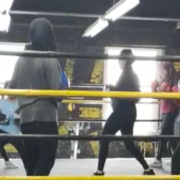
Clink to Club programme to help prisoners integrate after release
March 31, 2022 | by Matt Halfpenny
Prisoners preparing for release are being given a helping hand in adjusting to life in the community by England Boxing’s new Clink to Club Programme.
Launching in April after successful pilot schemes in 2020 and 2021, it will offer 48 inmates the chance to make changes to their lives than can help them leave crime in the past and make a new start for themselves.
Clink to Club is divided into two phases – one while inmates are still in prison and the other when they have been released.
Phase one sees England Boxing Club Support Officers go into a prison and deliver a two-hour workshop followed by a one hour of physical (circuit) training.

The workshops will feature expert guest speakers, such as former professional boxer and footballer Leon McKenzie, who has himself served time in prison.
Topics that will be covered include mental health, first aid, safeguarding, knocking out racism and how to be adaptable and resilient, as well giving offenders the chance to talk freely about why they have ended up in prison and the choices that are open to them.
Phase two follows when the prisoners have been released in the community and sees them link up with an England Boxing club.
They will benefit from paid-for training sessions in their respective gyms, receive equipment they can use and have the opportunity to take a boxing-related qualification such as an England Boxing Level 1 Coaching Course, Box Course or officials’ course.
Three separate cohorts of 16 of category C prisoners are to be enrolled onto the programme, at HMP Brixton in April and May and HMP Bronzefield in June (female-only).
“We’re delighted to have put together a programme that has a real potential to positively impact on the lives of the young men and women that we engage within the prison system,” said England Boxing’s interim Head of Community Development Avoen Perryman, who has helped introduce Clink to Club.
“Perhaps, even more importantly, we are excited by the possibility that the programme could help to prevent future victims of crime.
“Boxing has long been known as the second chance sport and we are so pleased to have this opportunity to work with so many people who are eager to turn their lives around through the power of our wonderful sport.
“Government guidelines currently do not allow for any actual boxing training to take place within the prison system, so Clink to Club has specifically been designed in such a way that inmates can still benefit from the positive influences of the sport, whilst also remaining in-line with prison policy.
“We would like to thank all the staff at HMP Brixton, HMPPS, The GLA, Maverick Stars Trust, and all the other clubs, coaches, speakers and volunteers who are part of the programme.”
A shortlist of suitable candidates for the programme will be put together by England Boxing in consultation with each of the prisons concerned.
Coaches at all clubs that will accept former prisoners will be trained in how to offer suitable support.
James Kilobo was part of one of the pilot programmes and is now boxing at Southern Counties club Odyssey following his prison release.
He said: “I really liked the way the course was broken down – there was so much information and it gave me so much motivation.
“The story of Leon McKenzie when he came in was a real inspiration and shows that your life is never over and you can make a change.
“I’ve loved going to the boxing, it takes away a lot of stress and felt really good. You are limited as to what you can do in prison, but this was a really good thing to be involved in and it’s broadened my options.”
It is hoped to widen the programme out to other clubs around the country in the long-term.
This initial phase of delivery, however, has been supported by funding from the Greater London Authority (GLA) and Sport England.
“We’re delighted that a grant from Sport Unites, the Mayor of London’s community sport investment programme, has enabled scale-up of the Clink to Club programme,” said Bevis Allen, GLA’s Senior Programme Delivery Manager, Sport Unites.
“The original pilot in HMP Brixton, delivered by England Boxing with Key4Life, had positive outcomes despite being adversely affected by Covid.
“It’s clear that a combination of quality in-custody mentoring and meaningful ‘through the gate’ connections to local boxing clubs can help reduce the isolation and risk factors the young men may experience on release and resettlement.
“It’s a great model, and we are hoping to apply learnings from the England Boxing programme to other sports and a wider club network in the capital going forwards.”


















